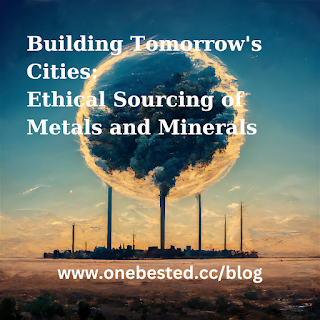Building Tomorrow's Cities: Ethical Sourcing of Metals and Minerals
Building Tomorrow's Cities: Ethical Sourcing of Metals and Minerals
Introduction: The Urgent Need for Responsible Sourcing
The world is rapidly urbanizing, with projections indicating that 70% of the global population will reside in cities by 2050. This demographic shift poses substantial challenges, particularly concerning environmental sustainability and achieving ambitious climate goals. To construct cities that are not only habitable but also environmentally conscious and resilient, the responsible sourcing of metals and minerals emerges as a crucial linchpin in this transformative journey.
Metals and Minerals in Urban Infrastructure: Essential Components
At the heart of our modern urban landscapes lie numerous metals and minerals. These materials, from copper and aluminum to lithium and rare earth elements, serve as essential building blocks that construct the infrastructure of tomorrow's cities. Renewable energy systems, efficient transportation networks, advanced technologies, and sustainable building construction heavily rely on these indispensable resources.
The Role of Metals in Clean Energy and Transportation
Transitioning toward cleaner energy sources, such as wind and solar power, demands a significant amount of metals like copper, nickel, and cobalt for energy storage systems and electrical infrastructure. Similarly, the development of electric vehicles, crucial in reducing greenhouse gas emissions, relies heavily on lithium, cobalt, and graphite for batteries and lightweight materials like aluminum for manufacturing.
Challenges and the Need for Responsibility
However, industries sourcing these crucial components historically faced challenges related to environmental degradation, resource depletion, and unethical labor practices. Herein lies the crux of the matter: the urgent need for responsibly sourced metals and minerals.
Embracing Responsibility: Innovations and Initiatives
The mining industry, acknowledging its pivotal role, is embracing innovations and initiatives to promote responsible sourcing. Technologies like blockchain enhance supply chain transparency, allowing consumers and businesses to trace the origins of minerals, ensuring ethical and environmentally conscious extraction methods.
Global Frameworks and Circular Economy Models
Global frameworks like the United Nations Sustainable Development Goals (SDGs) and initiatives like the Extractive Industries Transparency Initiative (EITI) promote responsible practices and foster collaboration between governments, industries, and civil society. Additionally, the shift towards circular economy models reduces the dependency on virgin materials and minimizes environmental impact by encouraging reuse, recycling, and repurposing of materials.
Conclusion: The Road to Sustainable Urbanization
In conclusion, the journey towards sustainable urbanization hinges on the responsible sourcing of metals and minerals. Ethical extraction, transparent supply chains, and a commitment to environmental preservation pave the way for cities that not only accommodate but also thrive amidst the challenges of the 21st century. Collective efforts and conscientious decision-making are crucial to build cities that are modern, genuinely sustainable, and resilient.


Comments
Post a Comment